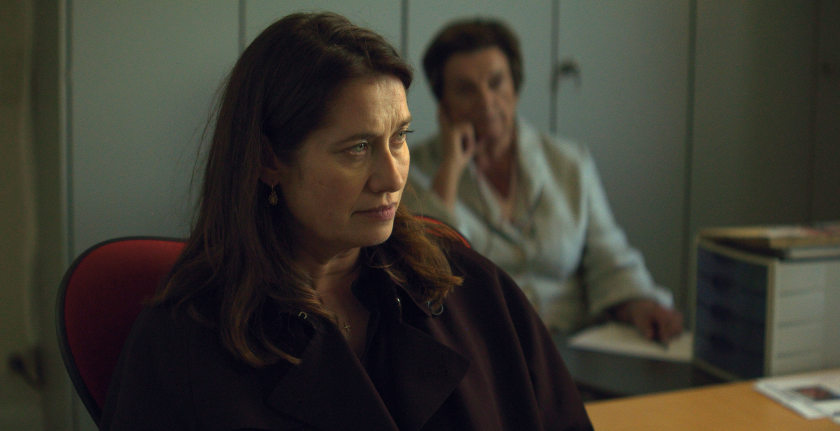Vassilis Kroustallis reviews the Belgian drama 'A Silence' by Joachim Lafosse.
What happens to our children when they have to face the sins of their fathers? The Belgian director Joachim Lafosse doesn't shy away from depicting the most destructive aspects of our family relationships, with a series of films that has its apex in the inimitably heart-wrenching 'Our Children' (2013).
More a sequel of sorts, his new and unquestionably solid and revealing film 'A Silence' (Un Silence) again examines a woman who needs to face the effects of being silent for so long. During the early film scenes, Astrid Schaar (Emmanuelle Devos is most expressive in its wonder) is at the police station, questioned by the police officer. When the officer asks for details about her son Raphael (Matthieu Galoux) trying to murder her husband and lawyer (François Schaar), the previous days and events start unfolding.
Based on the real story of the Belgian child rapist Marc Paul Alain Dutroux and the lawyer for the prosecution Victor Hissel (the role taken by Daniel Auteuil in the film), 'Un Silence' is a reconstruction that feels as close and as distanced at the same time. We see again (as in the 2016 Lafosse film 'After Love') a cohabitation that can no longer sustain itself, but here verbal assaults are substituted with separate spaces (gloriously lit to both suggest and hide by Jean-François Hensgens); the shared family apartment seems to have a lesser dramatic role to play here, and family car scenes (starting with the first scene, when we can feel Astrid breathing heavily) are here the equivalent of suffocation.
The plot itself capably withholds its evidence up to the mid-point of the film, and the catalytic role of the adopted son Raphael adds an extra dimension to a story that is still powerful but sometimes looks too distant to be absorbed. Lafosse consistently (also here) crafts his characters midway between letting go and letting be hidden. Astrid, the main character, is a person who won't stir up old 'events' (but new developments regarding her brother need to make her reconsider). She deftly prefers to ignore -in some very calculated scenes by Lafosse - old secrets she's been exposed to. She's not the only one; all three family members viewed the same incriminating material (computer photos) without any relevant discussion or acknowledgment. Astrid's daughter Caroline (Louise Chevillotte), who won't live along with them, is the only one to maintain her distance from the secrets -and a breath of fresh air in the otherwise stifled house space (with enough green and luxury to hide its indifference to proper communication).
In Lafosse's version, the exposition of secrets does not reveal shameful guilt but only unveils a disease that needs 'to be treated' (or has been successfully treated in the past). François Schaar's character (a better-written character than Astrid is) both believes in the power of the law to protect the innocent and thinks of himself as an innocent victim at the same time -getting solace at thinking he's the scapegoat of journalists gathering around his mansion. While his character is often on the sidelines, Auteuil is both powerful when among the crowd and powerless at home, in a definite (and harrowing) change of pace.
The positive surprise (and one of the film's dramatic assets) is Raphael's own story; his story is somehow underused here, but he is the one who processes things that he sees and acts upon (unlike his adopted mother). Raphael (with the calm demeanor used by Matthieu Galoux) makes it all dramatically interesting when his mother states early in the film that the things he watched 'drove him crazy'. His character behaves like the everyman and a person who found a foster home -only to discover that everything wasn't morally safe.
Music (Olafur Arnalds, Johann Johannsson, TERP) carefully separates the three characters with different themes and musical instruments from the start, showing that a house is not a home here. In Joachim Lafosse's canon, 'Un Silence' is a less distressing film than his others; he won't let his characters think, but have them face an avalanche of consequences for their inactions. This fact might make it a more exposed affair -yet viewed from a distance. At the same time, the film marvelously investigates trust and its breach; 'Un Silence' is like a pack of cards falling one after the other as a domino game. The film's three anchors are well placed, and you can sense that a point of view from the three characters occupies the respective screen time. Nowhere near as tantalizingly existential as 'Our Children' (whose last scene the film's attempted murder scene also evokes), the film is more of an essay on the mistaken perception of a failed family as just another symptom of a disease that will eventually treat itself. The narrative rhythm throughout the film is winning; its characters' wanderings into the huge space of the family house (including its swimming pool) are suggestive, and its neglect of the judicial procedure (which only appears at the film's end) is welcome. The ending carefully chooses to withhold information and face the film's most vulnerable character.
'A Silence' is a film in which characters finally start talking to each other. The trajectory it chooses to unfold sometimes looks too secure for its own sake, but its power to map a situation in all its nuts and bolts is undeniable.
Vassilis Kroustallis
'A Silence' screened in competition at the 2023 San Sebastian Film Festival.

